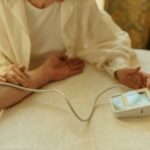Heart disease warning signs include: chest, arm, neck, and jaw pain, indigestion, sickness, sweating, a choking sensation and swollen ankles. Find out more…
Scare stories from friends, family and the media about people who have suddenly dropped dead with heart disease can be frightening. Around one in ten people in the UK have been diagnosed with some type of cardiovascular condition and others may have disease that has not been recognised. Could your loved one have a problem that is undetected and untreated?
Heart disease warning signs
Chest pain
Chest pain is the classic symptom of heart disease, but even so it is frequently ignored or mistaken for indigestion or a muscular ache. Professor Newby from the British Heart Foundation says that anyone who feels unwell with chest pain at rest, should get urgent medical attention:
If you have chest pain and you feel extremely unwell, you should dial 999 and get an ambulance as soon as possible. If it’s a heart attack, it’s usually described as a heaviness, tightness or pressure in the chest; people will often describe it as ‘an elephant sat on my chest’ or ‘it felt like a tight band around my chest,’ that sort of constricting feeling.
Prof Newby added that it’s also important to identify less severe heart disease so that it can be treated promptly:
If chest pains occur when you are exerting yourself, but go away when you stop, that would suggest it’s more likely to be angina. That would still mean you should go and see a doctor, but you don’t have to call 999.
If you would like to learn more about heart disease; the history, causes, and the various treatments, see Heart Disease: A Deeper Dive
Arm, neck and jaw pain
Cardiac chest pain can also spread into the shoulder, down the arm or up into the jaw. Don’t assume that a dull ache or a heaviness in the arm is due to rheumatism or a trapped nerve. Pain that spreads down the arm, especially the left arm could be down to angina or a heart attack.
As if that’s not enough, cardiac pain can also spread into the jaw, the neck and through to the back. Women are particularly likely to have this sort of atypical pain, so their heart disease is more at risk of being missed. Anyone with a spray or tablets of glyceryl trinitrate, should use their medication and seek medical advice urgently.
Indigestion
Too many people mistake cardiac pain for indigestion. The problem is that the heart, the gullet and the stomach are all pretty close together in the body. Pain in one can easily be mistaken for pain in another. The location, spread and triggers of the pain can give a clue- but if your loved one is feeling faint, clammy or unwell, it’s better to get help and leave the detective work to the doctors.
Sickness
Lots of things from food poisoning to migraines to hangovers can cause nausea and vomiting. It’s a common symptom and one which in the vast majority of people won’t have a cardiac cause. However, chest pain with nausea and a feeling of malaise could be a sign of a heart problem, so seek medical advice.
Sweating
It’s normal to sweat when overly hot, but sweat can also be a sign of severe infections and with heart attacks.
If your loved one has chest pain and appears clammy, call an ambulance immediately.
A choking sensation
It’s common for people in films to grasp at their collar and loosen their tie when they’re having a heart attack. That’s because the pain can rise into the throat, giving a feeling of constriction and inability to breathe. The word angina actually means “to choke”, so sudden inability to breathe properly, or grasping at the collar, could be a danger sign.
Swollen ankles
Puffy ankles are not an inevitable result of ageing; they can be due to water accumulation because the heart is struggling to work effectively. If your loved one is getting increasing swelling, make a routine appointment with their GP to exclude the possibility of developing heart failure.
Fatigue
The heart does the vital job of distributing nutrition and oxygen to the body. When it isn’t working well, it can cause feelings of fatigue. Weight loss is also a sign. Lots of people feel tired if they’re stressed, overworked or not sleeping well, but this fatigue is often more severe and long-lasting.
Palpitations
Palpitations are an irregular heartbeat that can be felt. It can be either fast or slow and it may be associated with pain or just a little discomfort. A fast irregular heartbeat, especially one associated with pain, dizziness or breathlessness should be investigated quickly.
Don’t let the fear of being diagnosed with heart disease prevent your loved one from seeking medical help. There are excellent treatments available which could control their symptoms, improve their quality of life and prevent a more serious cardiac event from occurring.
If you or someone you know is facing a diagnosis of heart disease, HomeTouch can help.
Our carers are on hand to provide a friendly face and a helping hand right through to more advanced care. They’re available for a few hours a day to full time live in care. Whatever the requirements, we can help you to find the care and companionship you or your loved one needs to help them to live safely and happily in their own home.
If you’re unsure about the prospect of care, that’s ok. You can download our impartial guide to elderly care (which is applicable no matter the age of your loved one) and get to know the many options available. There’s no harm in knowing more, and a carer might be able to provide you and your loved one with the support you need.





